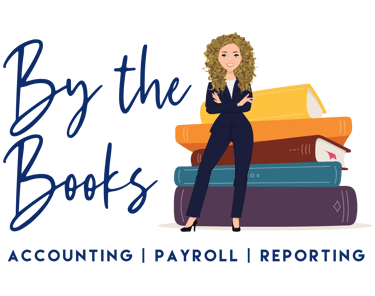
Avoid These Top 5 Accounting Mistakes as a Small Business Owner | By the Books ATX
Learn about the top five accounting mistakes to avoid as a small business owner. Maintain financial stability, make informed decisions, and comply with legal requirements. Read more on By the Books ATX.
6/8/20232 min read


As a small business owner, managing your finances and maintaining accurate accounting records is crucial for the success and growth of your enterprise. Proper accounting practices enable you to make informed decisions, maintain financial stability, and comply with legal requirements. However, it's not uncommon for small business owners to make accounting mistakes that can have serious consequences. In this blog post, we will discuss the top five accounting mistakes you should avoid to ensure the financial health of your small business.
Neglecting Regular Bookkeeping: One of the biggest mistakes small business owners make is neglecting regular bookkeeping. Failing to maintain up-to-date financial records can lead to errors, oversights, and poor decision-making. It is essential to establish a consistent bookkeeping system that includes recording all financial transactions, reconciling bank statements, and tracking expenses. By maintaining accurate and organized records, you will have a clear understanding of your business's financial position and be better equipped to monitor your cash flow and make informed decisions.
Mixing Personal and Business Finances: Many small business owners fall into the trap of intermingling personal and business finances. This practice not only makes it difficult to track business expenses but also complicates tax filings and can put your personal assets at risk. Establishing separate bank accounts for your business and personal finances is crucial. By keeping your personal and business finances separate, you'll have a clear picture of your business's financial performance, make tax season less stressful, and protect your personal assets in case of legal issues.
Failing to Reconcile Accounts: Failing to reconcile your accounts regularly is a common mistake that can lead to inaccurate financial statements. Reconciliation involves matching your bank and credit card statements with your recorded transactions to ensure they align. It helps identify discrepancies, such as missing transactions or banking errors. Regular reconciliation will help you catch errors early, prevent fraudulent activity, and provide a more accurate representation of your business's financial health.
Mishandling Cash Flow: Cash flow mismanagement is a significant problem for small businesses. Insufficient cash reserves can lead to missed payments, delayed payroll, and the inability to cover unexpected expenses. It's crucial to monitor your cash flow closely, accurately forecast your future financial needs, and establish a budget. By maintaining a healthy cash flow, you'll have the necessary funds to keep your operations running smoothly and seize growth opportunities.
Ignoring Tax Obligations: Small business owners often overlook their tax obligations until the last minute, which can result in costly penalties and unnecessary stress. Failing to file accurate tax returns, missing deadlines, or not keeping proper records can lead to audits, fines, and reputational damage. It's advisable to consult with a qualified accountant or tax professional who can guide you through the complex tax landscape, help you identify deductible expenses, and ensure compliance with local tax regulations. Staying on top of your tax obligations from the start will save you headaches down the road.
Avoiding these common accounting mistakes is crucial for the success and financial stability of your small business. By implementing proper bookkeeping practices, maintaining separate business and personal finances, reconciling accounts regularly, managing cash flow effectively, and staying on top of your tax obligations, you will set a strong foundation for your business's financial health and long-term growth. Remember, seeking professional guidance from an accountant or financial advisor can provide invaluable support in navigating the complexities of accounting and taxation, ultimately freeing up your time to focus on what you do best – running and growing your small business.


Quick Links
Contacts
Email us at candice@bythebooksatx.com
